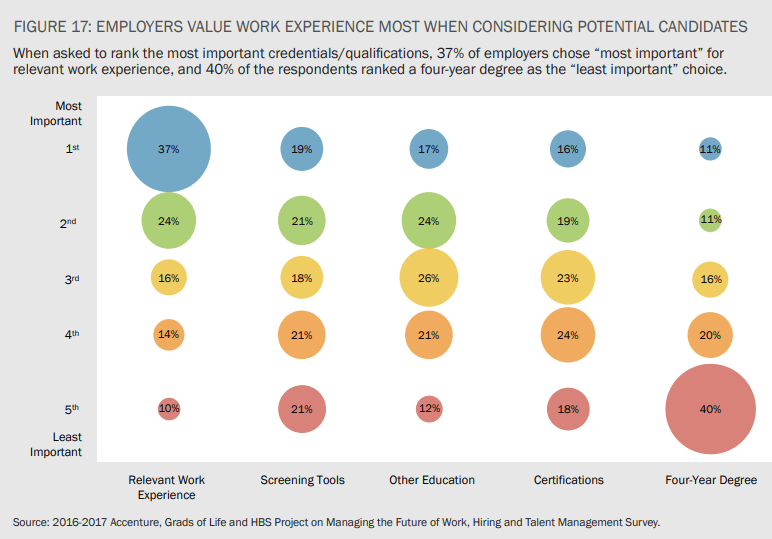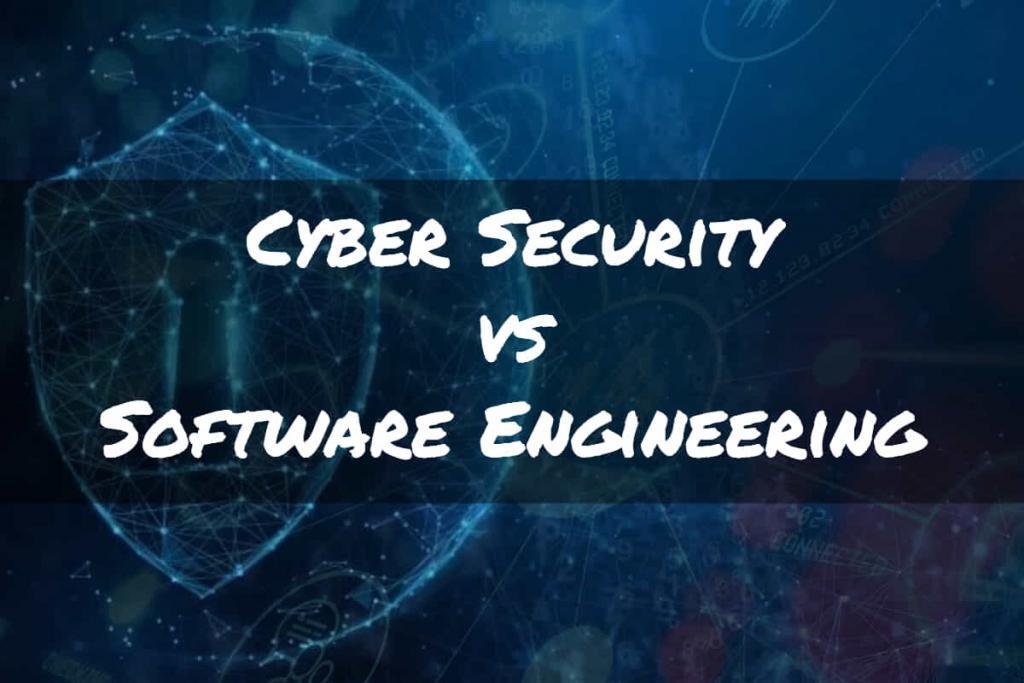I know you’re asking yourself, do I need a degree for cyber security?
You’re not alone in asking this question. And the short answer is yes, you can get a cyber security job, no degree needed!
But what you really want to know is how to work in cyber security without a degree.
First, here’s the main question you should be asking…
What Degree Do You Need for Cyber Security?
No, a degree is not required for cyber security!
And that’s because there’s such a huge demand of skilled security professionals, many companies are willing to overlook the degree requirement.
Here’s an example of one:

There are a lot of cyber security job postings that are just as accessible!
Can You Get into Cyber Security Without a Degree?
If you don’t have a college education, then you’ve got to prove yourself in other ways.
Don’t get me wrong, college is important, but it’s not everything.
Employers understand that getting a college degree is only one factor when it comes to finding good talent.
That’s why so many employers look for experience over a degree.

Yes, there are employers that prefer candidates with degrees. But while having a degree gives you an edge, there’s no guarantee that it’ll lead to a job in cyber security.
Ultimately, can you get a job in cybersecurity without a degree? Yes, but it’ll require hard work and dedication!
How to Get into Cyber Security Without a Degree?
Here are a few things that’ll help you learn how to get a job in cyber security without a degree:
Get an IT Support Role
It absolutely does not matter whether your first job is in cyber security! Even if you don’t get a job in cyber security, you need to gain some basic IT experience.
Start looking for IT jobs that aren’t the most glamorous and may not even pay that well. The whole point is to get any IT experience before you make the leap into cyber.
Some of the best jobs you can get are in IT Support, IT Help Desk, etc. There are many different names for it, but they all produce the same outcome…IT experience!
Even by working there for six months, you now have enough background experience to start thinking about cyber.
Seek out Internship or Volunteer Opportunities
To get a cyber security job without degree, you’re much more likely to be hired if you have some basic work experience. This experience can be in form of a cybersecurity internship, volunteering activity, or even a project.
Remember, you can still get an internship even if you don’t have a degree.
In a survey of over 300 global IT and cybersecurity professionals, the #1 piece of advice for entry-level professionals is to seek out experience!

Any of these activities can be a great way to gain experience and learn new skills, build your resume, and create a network of professionals in the field.
Get Your Certifications in Cyber Security Without a Degree
Security certifications increase your chances of getting hired for that first entry level position. Certifications also look great on resumes; they provide proof of your knowledge without requiring specific qualifications like degrees.
Organizations like CompTIA, ISACA, or ISC2 offer a variety of certifications in cyber security without a degree requirement and are designed for entry-level professionals.
Common certifications such as: CompTIA Security+, Cisco Certified Network Associate (CCNA), ISC2 Certified in Cybersecurity (CC) or Systems Security Certified Practitioner (SSCP), or ISACA’s Cybersecurity Fundamentals are all great certifications that require little to no prior experience.
ProfessorMesser is a great way to learn cyber security without a degree!
Find a Mentor
Learn cyber security from any person or place willing to teach! Find mentors who know how the industry works (including people currently working at small or large companies).
Mentors are a great way to understand the industry, current trends, and allow for excellent networking opportunities!
Women in Cybersecurity (WiCyS) Mentor/Mentee Program
Join a Cyber Community
You’ve got to surround yourself with like-minded individuals that live and breathe cyber which means belonging to cyber security groups. There are many cyber security communities either near you or online that you can join such as Bsides or even your local Meetup.
By joining these communities, you also afford yourself the opportunity to network with others that may be able to help you find an internship or job.
- ISC2 Chapter
- Bsides Chapter
- Meetup Groups
Network as Much as Possible
As I briefly mentioned, networking is a vital aspect of job hunting, and it makes sense to do it as early as you can. If you’re just starting out, networking is awkward because you don’t have much to show for yourself in the beginning; however, it’s a great way to prove yourself and get your name out there.
Networking doesn’t just mean social media sites like LinkedIn or Facebook. You need to connect with people in person, such as on Meetup, who can help you find more opportunities.
To network effectively, make sure you are doing it with people who are in or close to the field that interests you most. Try to make friends or associate with people who work in cyber security and ensure that you maintain those relationships even after getting a job.
This shows initiative and seriousness about wanting this career path without having all the credentials yet (or even having finished college).
Learn About the Industry
Take every opportunity to learn about the cyber industry from news outlets, books, and forums, etc. The National Initiative for Cybersecurity Careers and Studies provides excellent information for you to get your career rolling in the right direction.
Read up on current trends (and older ones too) and participate in discussions related to cyber security topics online. Also, try to figure out which way the industry is moving and research what employers are looking for in new hires.
Show that you really care by learning as much as possible from as many sources as possible—even if your only exposure has been through watching YouTube videos or listening to podcasts.
Take a Cybersecurity Bootcamp
There’s no shortage of online courses available to help you learn about cyber security. Courses range from introductory classes to advanced training programs. They cover topics such as computer networking, cryptography, malware analysis, and the list goes on.
But before you decide to take on a bootcamp, always determine if a cyber security bootcamp is right for you.
Learn Cyber Security Tools
Learn security coding and tools, such as vulnerability scanners and penetration testing tools. Knowing how to use them will help you understand what’s going on behind the scenes when you’re working in cyber security.
You’ll also have a strong foundation for learning about the various other security tools that companies utilize.
Practice with online tools to keep your skills up to date with current trends in technology!
- TryHackMe
- HackTheBox
- PentesterLab
Maintain a Strong Portfolio of Your Experience
It’s important to have a strong cybersecurity portfolio of your past hands-on work.
You can start by creating a GitHub account to showcase your coding or other IT skills.
You can also create a simple and inexpensive Wix or Squarespace website that’s very user friendly and includes:
- An effective cyber resume that lists all relevant experience and certifications
- A portfolio of projects you’ve worked on
- Technical documentation from each project (this may be simple notes about what was done, or something more elaborate)
Be Patient and Stay Motivated!
Be patient and don’t think you’re going to get hired right away. Just remember that applying for jobs is a job.
If you’re not spending 10-12 hours per day applying or networking, then you’re not doing enough, assuming you don’t have other responsibilities. And even with that amount of tenacity, it can take as long as six months just to get your foot in the door!
If you’re passionate about the field and willing to put in the time and effort required for success, then you can land a full-time position as an entry-level cyber security professional.
What Are All the “No Degree” Cyber Security Jobs?
There are several cyber security jobs where having a degree isn’t a deal-breaker. Here are a few examples where skills can trump formal education:
Security Analyst: Starting as a security analyst, you might be monitoring networks for security breaches and investigating when an incident occurs. It’s a role that values keen observation and problem-solving skills.
Penetration Tester (Ethical Hacker): This job involves trying to break into computer systems, networks, or applications on purpose to find vulnerabilities. It’s like being a good guy hacker, using your skills to improve security.
IT Support with a Security Focus: What I mentioned before. Many start in general IT support roles and specialize in security over time. You’ll learn a lot on the job, dealing with various technologies and security challenges.
Cyber Security Technician: Technicians work on the front lines, implementing and managing security solutions (like firewalls and antivirus software) and may also assist in developing organizational security policies.
Here’s are more cyber security jobs that don’t need a degree:
- Incident Response Analyst / IR Analyst
- Threat Analyst
- Threat Intelligence Analyst
- Vulnerability Analyst
- Security Operations Center Analyst / SOC Analyst
- Cyber Intelligence Analyst
- Security Compliance Analyst
- Digital Forensic Analyst
- Malware Analyst
- Cloud Security Analyst
- Identity and Access Management Analyst / IAM Analyst
- GRC Analyst
- Cloud Security Analyst
- Network Security Analyst
- Application Security Analyst
- Mobile Security Analyst
- IoT Security Analyst
Conclusion
Wrapping it up, do you need a degree to work in cyber security? Not at all; getting into cyber security without going to college is definitely possible. All it takes is a lot of self-study, passing a few certifications, and really getting some real-world experience.
Again, knowing the right people can sometimes open more doors than just having a degree. It’s going to be tough, and you’ll need to keep pushing yourself to learn and grow, but if you’re really into cyber security, you can make it happen.
So, if you’ve got the drive and you’re ready to put in the effort, a fulfilling career in cyber security could be yours, degree or not.
FAQs
Do Cyber Security Jobs Require a Degree?
No, cyber security jobs don’t require a degree.
Can You Get a Cyber Security Job Without a Degree?
Yes, you can get a cyber security job without a degree.
What Degree Do Your Need for Cyber Security?
While no degree is required, you may obtain degrees in Cyber Security, Computer Science, Software Engineering, Network Engineering, or any field that provides an education in coding, networking, risk, or compliance.
How to Get a Cyber Security Job Without a Degree?
Start with an IT support role to build foundational IT experience, even if it’s not directly in cybersecurity. Look for internships, volunteer roles, or projects to gain hands-on experience, and earn entry-level certifications like CompTIA Security+ to validate your skills. Find a mentor and join cybersecurity communities to network, stay current, and build connections. Learn industry tools, create a portfolio to showcase your skills, and maintain patience and persistence as you apply for entry-level cybersecurity positions.
Do You Need a Bachelor’s Degree for Cyber Security?
No, a bachelor’s degree isn’t required for cyber security. If you decide to get a degree, an associate’s degree will also suffice. Just keep in mind that many employers still prefer a bachelor’s degree as a minimum.
Do You Need a Computer Science Degree for Cyber Security?
No, you don’t need a computer science degree for cyber security; although, it may be helpful. A computer science degree will increase your odds of getting a job interview.
What Do You Think?
Do you think I’m wrong…can you do cybersecurity without a degree?
Did you get a job without a degree?
If you recently found a cyber security job, do you think a degree helped you?
Either way, let me know by leaving a comment below right now.



